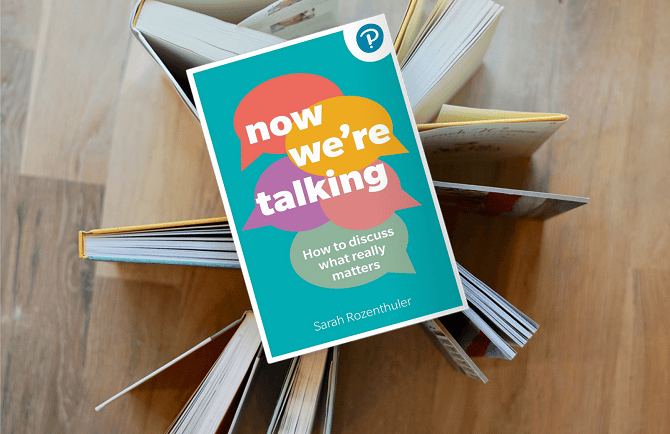Book Review - 'Now We’re Talking – How to discuss what really matters'
'Now We’re Talking – How to discuss what really matters'
2/12/20254 min read


Is this a self-help or business book? I wonder what the commuters thought when I was reading it on the train, or my daughter and her friend when I read it in the café. Maybe I needed help with relationship problems, depression, navigating the modern perils of parenting or fulfilling my potential at work.
It is a multipurpose book as ‘our inability to talk about what really matters cuts across families, organisations and nations,’ writes the author Sarah Rozenthuler, a chartered psychologist who reflects on her life and literary research on dialogue to explain why talking matters.
As an aspiring author and screenwriter I am fascinated by dialogue and only use it when action cannot tell the story. I expect Sarah is aware of the screenwriting guru Syd Field’s quote: ‘Action is character. What a person does is what he is, not what he says.’
When I was on the train from London to Glasgow, three young men entered the quiet carriage. One played his music on his phone. Within five seconds I told him to put on his headphones. He turned it down but no headphones. I pointed at the no noise signage; he told me he was partially deaf and needed it loud to hear it. There was a heated but controlled exchange where we had our say and displayed our machismo. They moved when I showed I was a middle-aged man who needed to sleep. I could hear music from other passengers. It was not just them, almost everyone was breaking the rules.
Five minutes later after reflecting on my behaviour and what I learned from this book, I apologised for being grumpy and told them I was sleep deprived. They accepted my apology in good spirits and the one I spoke to asked if I have a headache as he reached inside his coat. Was he going to pull out a gun or paracetamol?
‘I’m fine, thanks, I just need sleep,’ I told him, worried if it wasn’t a gun he might offer me some party drugs and we would spend the rest of the journey dancing our heads off in the carriage to trance music. They were not unruly youths, their music was not that loud. This book helped me identify my triggers of wanting to be a young man again to stand my ground and show my peers I was their equal.
By understanding my reaction, I was able to follow Rozenthuler’s advice of being objective and taking a pause to re-engage my ‘thinking brain’ to choose what I do or say next. I cannot control other people but I can control myself. Rozenthuler wants you to develop the confidence, competence and courage to do what you say and say what you do.
Maybe it was this book or the Morrisons Christmas advert, but I can’t stop singing this lyric from the musical Bugsy Malone:
You give a little love
And it all comes back to you
You're gonna be remembered
For the things that you say and do
Many business books read like notes from PowerPoint slides, inferior rewrites of better books or like the diary of someone who keeps getting promoted through the powers of self-belief and everyone else fooling for it. At least they have written a book which is more than I can do. However, what I admire about Rozenthuler is her authenticity in writing a topical book about common issues that we are all talking about:
Will making managers good talkers turn them into great managers?
If you find time to talk, what are you going to talk about to make it worthwhile?
How can you tell someone, I do not want to do this rubbish work, do it yourself or just don’t it because no one cares?
Why are our podcasts and presentations about creating the right culture often better than the reality?
I understand you are upset and you are blaming me, but if I gave in to your demands and let you do what you want, would you be the perfect employee?
Sometimes you have to face bad jobs, bad colleagues and other challenges before you enjoy work.
When you like and respect your colleagues, you want to spend time in the office.
Leadership exists across pay grades – whether you lead the organisation, team or yourself.
‘Changing the way people talk changes the way people act. Changing the way people act changes the outcomes that result,’ says Rozenthuler to reinforce her point that conversations have a positive or destructive impact on the organisation. She makes the term ‘holding space’ more than a cheesy HR term, describing the ‘container’ you have to build to create a safe space to let the dialogue flow. I did get confused with the number of four-point models to enable these conversations, although they all made sense. Read the book to find out more. I will share the SCARF acronym to explain the five social threats that can leave you stuck in a habitual reaction and prevent meaningful dialogue.
Status – Speaking to your boss, receiving a performance review or being left out of a meeting.
Certainty – Financial concerns, someone acting incongruously, not knowing others’ expectations or sensing someone is not telling the truth.
Autonomy – Micromanagement, unilateral decision-making or being told what to do.
Relatedness – Feeling isolated doing a project, information being withheld or someone acting in an untrustworthy way.
Fairness – Different sets of rules for different people, moving the goalposts or a gap between what’s said and what’s done.
I loved the reference to nonviolent communication and the emphasis on the damage caused by toxic behaviours, distrust and power struggles. Learn to read the room whether you are talking or listening to gauge which way the wind is blowing and what this means for you. Even if we talk the same language, we have different ways of talking to say what we want to say. This book can help create a lingua franca in conflict resolution.
With so much evil in the world, anything that promotes peace deserves recognition. If I ever meet Sarah Rozenthuler, I will tell her I loved Now We’re Talking, I will use it at work and you have inspired me to write an HR book. If only I could talk to some literary agents and publishing houses.
Inspiration
What we talk about when we are working and living
© 2025. All rights reserved.
